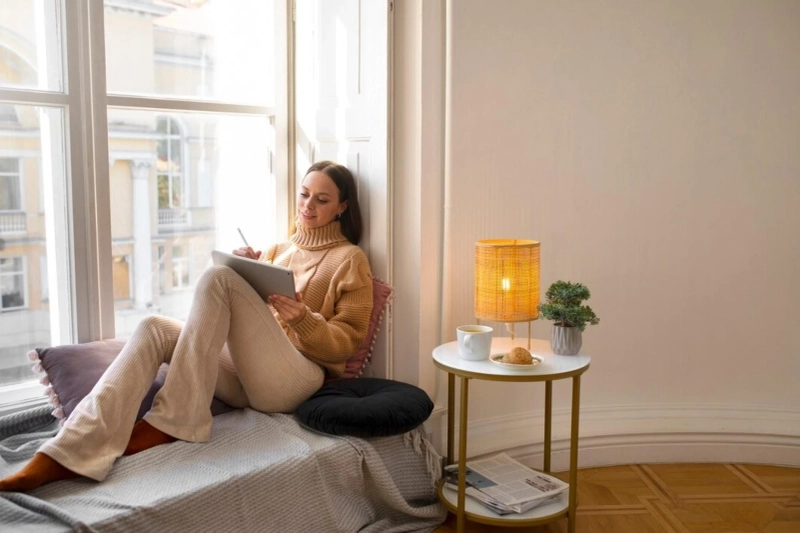Clarity, intention, and well-being are the foundations of minimalist living, which is more than just a design fad. As our lives become increasingly cluttered with possessions, responsibilities, and digital noise, many are turning to minimalism as a way to reclaim peace and focus. At its core, minimalist living emphasizes quality over quantity, mindfulness over consumption, and freedom over accumulation. But beyond the clean aesthetic, there’s powerful psychology behind why this lifestyle works—and why so many find happiness in less.
Reducing Mental Clutter
Physical clutter often leads to mental clutter. When our environments are chaotic, our minds mirror that chaos. Minimalist living helps reduce decision fatigue, clear mental distractions, and create a sense of control. By surrounding ourselves only with things that serve a purpose or bring joy, we reduce unnecessary stimuli and make space for clarity, focus, and calm.
Gaining Control in a Noisy World
In a world dominated by marketing and instant gratification, minimalist living is an act of intentional rebellion. It allows individuals to define what truly matters on their own terms. To explore how minimalism can benefit your lifestyle and mindset, visit mygreenbox.in platform. Psychologically, this fosters autonomy and empowerment. You're saying "yes" to yourself when you refuse excess. That shift in focus builds confidence and supports long-term mental well-being.

Lowering Anxiety and Stress
Clutter and overconsumption have been linked to increased cortisol levels, the hormone associated with stress. Minimalist environments, on the other hand, promote a sense of order and stability. Clean, open spaces can make you feel calmer and more in control. This has a ripple effect—reducing anxiety, improving mood, and even supporting better sleep quality over time, as cluttered environments have been shown to disrupt focus and increase mental fatigue in studies like this one on how clutter affects your ability to concentrate.
Increasing Gratitude and Contentment
You start to appreciate what you already have when you cut down on the cacophony of perpetual wanting. Minimalism encourages gratitude by shifting your mindset from “more” to “enough.” This outlook fosters a deeper appreciation for simple joys—like a morning routine, a meaningful conversation, or a beautiful sunset. The psychological reward is contentment, something far more satisfying than consumerism’s temporary highs.
Strengthening Focus and Productivity
Minimalist living naturally enhances focus. With fewer distractions in your environment, you can better concentrate on your tasks and goals. Psychologically, this taps into the concept of “flow”—a state of deep, productive engagement. Whether you're working, reading, or creating, a minimalist setting supports uninterrupted focus and encourages meaningful work.
Promoting Better Financial Habits
Minimalism often leads to a more intentional relationship with money. Rather than spending impulsively, minimalists tend to ask: “Do I really need this?” This mindset shift reduces financial stress and encourages saving for experiences or investments that truly align with your values. The emotional benefit? Less guilt, more freedom, and a sense of control over your financial life.
Building Stronger Relationships
When you strip away the distractions of material possessions and social pressure, what remains are the people and connections that genuinely matter. Minimalism encourages deeper, more authentic relationships. Time, energy, and attention are redirected toward shared experiences rather than keeping up with appearances. This creates stronger emotional bonds and fosters a greater sense of belonging.

Aligning Lifestyle with Personal Values
Value alignment is among the most significant psychological advantages of minimalist living. When your lifestyle reflects what’s truly important to you—whether that’s sustainability, creativity, or time with loved ones—you experience a greater sense of integrity. This alignment boosts self-esteem and enhances life satisfaction because your choices consistently affirm your identity and purpose.
Where to Explore a Mindful Shift
Take a moment to visit the mygreenbox.in portal if you're prepared to delve more into the advantages of adopting a minimalist mentality and would like to start the journey. From lifestyle tips to thoughtful product curation, it’s a helpful space to start simplifying your life and living with more intention.
Conclusion
Minimalist living goes far beyond decluttering your home—it’s a transformative approach that reshapes your mindset, enhances mental health, and aligns your life with what truly matters. By understanding the psychology behind it, you can make small but meaningful changes that improve your focus, reduce stress, and lead to lasting contentment. In a world full of noise, minimalism offers peace—not by adding more, but by letting go.



